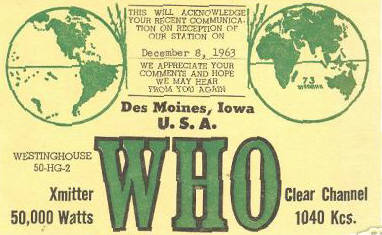
QSL cards
Many listeners mail reception reports to shortwave broadcasters in exchange for confirmation cards - known in the hobby as QSL cards - as well as program schedules, frequency lists, pennants and other souvenirs.
``One of the more satisfying aspects of DXing,'' according to the Ontario DX Association, ``is collecting QSL cards and letters from stations you have heard.'' (QSL is morse code shorthand for verifying the contents of a transmission.)
Some stations even accept reception reports via E-mail.
`` International broadcast stations use reception reports, among other means, to judge the quality of their signal,'' according to ODXA. ``The sooner they receive it the more value it is to them. So waiting weeks or months after the program can be counter productive for you both.''
The web site of the magazine Monitoring Times notes:
Most shortwave broadcasters will send you a QSL card verifying reception of their signal if you send them a detailed report of what you heard and when you heard it. It’s not as easy as it sounds. Many small countries are strapped for funds and may not send a QSL card unless you send a self-addressed return envelope with International Reply Coupons (IRCs) enclosed. It can also take weeks or months for a reply.
Advice from Ontario
The ODXA offers the following advice for corresponding with shortwave broadcasters:
QSLing these stations involves writing an accurate reception report of a station you have heard, mailing it to the station, and waiting for a reply. It sounds easy enough, and it is, but some techniques can help to improve your success rate.
· When and how the station identifies itself.
· The name of the program.
· Content of the news or other program.
· Names of the announcer(s).
· Items unique to the locality of the station.
How much detail you can record often depends on reception conditions and the nature of the program. But the more detail the better. Also include an indication of how well the signal was received. Shortwave reports use the SINPO code which is described as follows.
· Signal. Refers to the strength of the signal received.
· Interference. Indicates whether other stations were interfering with the signal.
· Noise. Identifies the presence of atmospheric or other noise on the frequency.
· Propagation. Refers to the fading characteristics of the signal.
· Overall. Tells the station how well you received their signal.
For each code use the digits 5 to 1 meaning 5 - excellent, 4 - good, 3 - fair, 2 - poor, 1 - poor. So if you heard Radio Australia with an excellent signal, but had some fairly strong interference from Russia, no atmospheric noise, and slight propagation you might use the code 53544 to record the quality of your reception.
Some international broadcasters will want you to send postage. But the major broadcasters do not require it. Using a guide such as the World Radio and TV Handbook can help to identify stations that require postage. When necessary, postage can be sent in the form of an International Reply Coupon (IRC) available at all Canada Post outlets.
Advice from Holland
Radio Netherlands offers the following hints:
A report on one single frequency on one day has little value these days, though the station will probably still send you a QSL card.
The experienced listener does one, or both, of the following:
Notes the reception quality of a number of frequencies carrying the same programme over a period of three to six days.
When a particular channel is blocked by interference, a check is made to see whether another frequency nearby is more suitable as an alternative.
Be candid!
DXing.com says listeners should be candid in their comments because ``most international broadcasters today rely upon reception reports more for listener input about programming than they do for information on how well they are being heard.''
Therefore:
Don’t be afraid to candidly state what you really liked or disliked about their programming, and feel free to make suggestions about what you would really like to hear. Some major changes have been made as a result of these suggestions.
For example, at the height of the Cold War in the late 1960s, the USSR’s Radio Moscow referred to American men who had no formal government title, such as "Governor Smith," simply by their last names, as in "Smith" and "Jones."
A letter from an American listener pointed out that this sounded rude and uncultured, and that letter was read on Radio Moscow’s "Moscow Mailbag" program.
The hosts said they were unaware of how this was perceived and no offense had been intended, and from that day forward Radio Moscow used the title "Mister" when referring to American men in its newscasts and commentaries!
